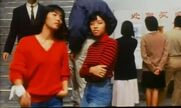Compared with the gorgeous modern life in the previous three films, "Guling Street Teenage Murder Case" left a shadow in my mind, a mottled shadow of a conservative and closed era. These shadows are not only like the corners that the weak illumination of the 100W light bulb cannot clear, but also like the flashlight in the flashback, leaving a large section of dark space.
When planning the shooting of "Guling Street", Yang Dechang established his own film studio, and a typical symbol of this studio is the 100W light bulb. I don't know if this is a metaphor for Yang Dechang's doubts and dissatisfaction with the light.
Some people think that Yang Dechang's use of various scenes in which the lights are on and off, and the dark and dark inside and outside are contrasting with his narrative era. I don't agree with this view, because "Mahjong" and "Independence Era" reflect the current existence. Among the works, I also cannot see a kind of brightness. Therefore, I believe that the gloom is Yang Dechang's consistent expression of ethical pain.
Whether it is family ethics, social ethics, or personal ethics, the sober ideology and the dim ethical reality make ethics do not have a bright and bright side in Yang Dechang, the repression imposed by others in society, and the repression created by couples in the family. , in the face of the repression formed by self-release and self-restraint, everywhere. The realistic feeling of self-existence faces challenges and compulsions in front of every corner and every reality, and everyone living means anti-challenge and anti-compulsion.
Different from the way the other three films express ethical dilemmas, the method adopted by "Guling Street" is relatively straightforward. It does not create the kind of strong individualized rebound that an individual makes when he is on the verge of a limit, but expands the closure of society. At the limit, this closed reality is confirmed through personal actions. This is a way to let the history and personal destiny run to the edge, and finally use the inexplicable tragedy to contrast with the historical reality of the mud and sand. Tragedy is used to set off history, and history is used to illustrate tragedy.
The discourse direction of "Guling Street" is very clear on the surface, it directly points to education and politics at a certain historical stage. The beginning and the end of the film are broadcasting the admission list of the university, the tanks and the bus are often side by side, the young lovers are talking across the road while the tanks are passing through, etc., all of which show the isolation and brutality, violence and power at that time. Reproducing these scenes, it seems that it should be associated with an angry accusation.
But what surprised me and shocked me was Yang Dechang's calmness. Yang Dechang was telling these facts in a sloppy and lengthy manner. He didn't seem to be excited. Except for a little bit of character sympathy, his emotions were more affected by excluded from the film.
The story takes place in Taiwan in the 1960s. Xiao Si was born into a family of civil servants. The whole Taiwan has the smell of war against the mainland. However, under the political pressure, some western pop culture interests began to spread again. Heterosexuals are interested in baseball, pop music, and pornography, and they often go to billiards, small concerts, and ice cream parlors. In these places, there is an atmosphere of gang struggle. Gangs kill each other. Xiao Si fell in love with a gang leader - Xiao Ming, the ex-girlfriend of Hani's boss, who was later killed in the gang struggle. Xiao Si's original righteous and steadfast father was investigated and interrogated because he refused to complicity. After he came out, he became cowardly and swayed. At this time, Xiaoming met Xiaoma's noble friend Xiaoma again, and had an emotional entanglement with Xiaoma. Xiao Si became more and more dissatisfied with reality, and assassinated Xiao Ming in jealousy.
It can be said that this movie gave me more interest, why is Yang Dechang calm? For Yang Dechang himself, some elements in this film should imply his memories of childhood. In 1960, it was also his own junior high school. Is this life that should be full of nostalgia just being reproduced in violence and darkness? What is Yang Dechang's concern for filming this film with hidden emotions?
The answer I found was: what Yang Dechang did was an investigation of pure morality in the dark age. What he cared about was whether morality could be pure in the closed and totalitarian reality of existence? Is there a pure morality in human beings?
In fact, the moral question is a social one. Any person's moral choice is not only related to the interests of his individual and group, but also affected by some other factors. The morality of secular life can only be within a certain category of morality. People only speak morality within this category, and beyond this category, the moral standards will be skewed. For example, for the entire human beings, people are only concerned with morality, not necessarily with respect to other creatures and living environments. In the face of today's increasingly destructive environment, in the face of our history of slaughtering animals, have we ever taught them morality? Even among human beings, moral standards are not constant. Isn't war between human beings the greatest blasphemy against human morality? !
This makes moral limitations necessarily lead to a certain moral shame. This moral shame sometimes strikes after one's own unethical behavior, and sometimes during a lifetime's moral summary. That is to say, people may be ashamed of their own immorality, and likely to be ashamed of the so-called "morality" in this life.
And a powerful factor in avoiding this moral shame is purity. Purity will make morality transparent, and even sublime the power of inspiration, and even become eternal. But this pure morality necessarily requires the abolition of all moral motives and a return to eternal devotion and serenity of desire.
But what is the eternal serenity of devotion and desire? Assuming it exists, is it moral to the devotees themselves?
From my point of view, pure morality does not exist in the mundane category. If pure morality exists, then it must exist in the beyond mundane category.
Returning to "Guling Street" from such a standpoint, we find that Xiao Si's behavior is the inevitable choice of secular morality. His original youth and integrity, his father's integrity, and Xiao Ming's innocence in his eyes were all destroyed in this worldly situation. He was faced with a choice, but he didn't know how to choose. But the reality forced him to take action, either ignoring the relationship between Xiao Ming and Xiao Ma, and living with atrophy; or taking action against Xiao Ma or Xiao Ming.
In my sense, Xiao Si was not meant to take action. But he suddenly heard Xiao Ming's gentle call. In front of this call, Xiao Si was forced to the edge of choice. It is the subconscious that dominates Xiao Si to fulfill his moral obligations and end Xiao Ming's disgraceful life, but the dilemma is that when Xiao Si takes such moral behavior, he immorally deprives others of their lives.
It was very easy for us to push Xiao Si's unethical behavior to the society and the entire political and educational environment at that time, and it was also the easiest and most efficient way to shirk responsibility for Xiao Si. But I always think that Yang Dechang's thinking does not stop at this point, because the character of Xiao Si's purity, justice, vigor, and politeness is actually like the embodiment of pure morality, through Xiao Si's behavior to examine morality , is a reflection on moral purity.
Some of my friends who have watched "Guling Street" have mentioned to me "Sunny Days" directed by Jiang Wen one after another. I always thought that what Jiang Wen was talking about was youth, youth and romance under totalitarian politics. It provides us with a lot of admirable feelings, but it fails to arouse our moral thinking, which is the ideological gap between the two directors.
"Guling Street" was Yang Dechang's work in 1990, which was nearly five years earlier than "Sunny Days". It won the Grand Jury Prize and the International Film Critics Award at the Tokyo International Film Festival in 1992, which further enhanced Yang Dechang's international reputation and paved the way for his future success in Cannes.
View more about A Brighter Summer Day reviews











